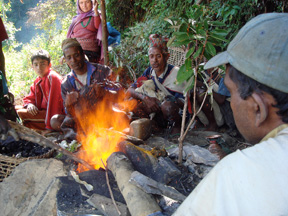The Copper Village
Tama Gaun NEPAL / 2015 / Nepali / Color / Blu-ray / 90 min
NEPAL / 2015 / Nepali / Color / Blu-ray / 90 min
Directors, Photography, Sound: Dipesh Kharel, Frode Storaas
Editing: Dipesh Kharel, Saito Asami, Frode Storaas
Source: Dipesh Kharel
Okharbot in western Nepal is a village with a long history of copper mining. Due to the impact of globalization however, the mine has lain idle for thirty-five years. Former miners and local residents gather to re-enact the vanishing practice of mining and smelting. The film captures village life and its festivities, where vestiges of the caste system remain, through the eyes of a visual anthropologist. What started as a research project by the filmmakers revitalizes the villagers and they find they are once again mining, as if they had never stopped. Little by little the film moves beyond the bounds of the documentation of a re-enactment.
[Director’s Statement] Okharbot in western Nepal is a village with a long history of copper mining. Due to the impact of globalization however, the mine has lain idle for thirty-five years. Former miners and local residents gather to re-enact the vanishing practice of mining and smelting. The film captures village life and its festivities, where vestiges of the caste system remain, through the eyes of a visual anthropologist. What started as a research project by the filmmakers revitalizes the villagers and they find they are once again mining, as if they had never stopped. Little by little the film moves beyond the bounds of the documentation of a re-enactment.
Our audio-visual records revealed that the impact of globalization is stronger on the population of Okharbot than perhaps that of any other place. Over the last few decades, the open market policy of the Nepal Government has resulted in an increasingly alarming impact on the miners’ families and traditional social life in the village. More specifically, the local copper industry based on traditional technology and knowledge has collapsed after the commercial copper industry started to import into the Nepali market. The miners lost their traditional work and they began to migrate from the village to find employment.
Before the era of globalization, the Okharbot village existed locally, autonomously, distinct and well-defined, with culturally-sustaining connections between geographical location and cultural experience. However, today, the culture of globalization has made a multi-pronged attack on the very foundation of the villagers’ existence, socio-culture and livelihoods. Their endangered language, cultures and way of life risk extinction because of the imposition of the culture of globalization. In this context, this film aims to document a coherent narrative of the former miners and the village and record their valuable age-old traditional knowledge of the copper-mining process.
 (From the right)
(From the right)Dipesh Kharel,
Frode Storaas
Dipesh Kharel, from Nepal, got his Masters degree in visual anthropology and documentary film studies at the University of Tromso, Norway in 2006. He has already produced several award-wining documentaries, notably A Life with Slate (2006) and Playing with Nan (2012), which have been screened at several international film festivals and won several prizes, at festivals such as Film South Asia, the RAI International Festival of Ethnographic Film (2007), and the Kathmandu International Mountain Film Festival. Currently Dipesh is a PhD candidate at the University of Tokyo.
Frode Storaas is a filmmaker from Norway and professor of Visual and Social Anthropology at The University Museum of Bergen.
